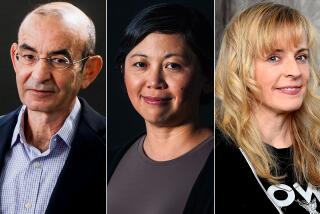For California Poet Laureate, Names Both Large and Small
The writing staff of TV’s “Will & Grace” didn’t make the cut.
Fifty-one more California wordsmiths ended up on the scrapheap too, despite resumes gilded with prestigious awards, fellowships and publications.
In the end, a Beat Generation standout, a bilingual chronicler of Chicano life and a multimedia Renaissance man emerged Wednesday as the finalists to become California’s first formally chosen poet laureate.
Now it falls to Gov. Gray Davis to nominate Diane di Prima, Francisco Alarcon or Quincy Troupe to a post that has existed since 1915 but was largely political until last year, when the Legislature approved a detailed set of qualifications and duties for it.
The multitiered process to pick a poet laureate initially produced a rather muted response from California’s literary community.
Several of the state’s best-known poets declined to be nominated, including Pulitzer Prize winners Gary Snyder and Philip Levine, former U.S. Poet Laureate Robert Hass and Bay Area legend Lawrence Ferlinghetti. A few days before the Feb. 19 deadline, the council had received just 10 submissions.
But a last-minute blast of publicity brought a cascade of 45 more applications, some from unexpected quarters. The 11-member “Will & Grace” writing staff, for example, submitted itself for the job.
“We are the poets of the Southern California landscape,” said Jeff Greenstein, one of the show’s executive producers.
Their entry didn’t survive the first judging round, which culled the applicant pile from 55 to 21.
“Maybe if the writers of ‘Six Feet Under’ had been nominated,” quipped panelist Jack Hicks, a professor at UC Davis.
“Well that’s just mean,” Greenstein shot back. “No one ever takes comedy seriously.”
A five-member panel convened Wednesday in Sacramento to pick three finalists, looking for poets with national stature and the ability to act as ambassadors for their craft.
In Troupe, Alarcon and Di Prima, they chose starkly different stylists, all with proven ability to communicate across regional, generational and ethnic lines.
Troupe, 59, may be as well-known for his radio show, “The Miles Davis Project,” and for the autobiography he penned with Davis, as for his poetry. His electric performance style helped the La Jolla resident, who also teaches at UC San Diego, win the heavyweight title twice at the annual Taos Poetry Circus.
Alarcon, 48, who oversees the Spanish for Native Speakers program at UC Davis, is one of the nation’s most prominent Chicano poets. He has written 10 volumes of poetry, including “Snake Poems,” which won the 1993 American Book Award, and an acclaimed children’s book.
Di Prima, 67, born in Brooklyn but a longtime San Francisco fixture, captured the Beatnik era, both in poems and autobiographical writing, and by editing several poetry anthologies. She co-founded “The Floating Bear,” a periodical that featured works by William S. Burroughs and Jack Kerouac, and has written numerous plays.
“It is a great honor to be considered,” Di Prima said. “California is my country, in a way. How we see the world is unique.”
The governor is expected to pick from among the finalists by July, sending one name for confirmation by the state Senate. The winner will serve no more than two two-year terms, during which he or she must give public readings and take on a project.
Di Prima said she would use the position to reach out to working people, urging them to write based on their experiences. Greenstein said the “Will & Grace” staff would have brought an episode of the New York-based show to California.
“Maybe that’s California’s loss,” he said.
More to Read
Sign up for our Book Club newsletter
Get the latest news, events and more from the Los Angeles Times Book Club, and help us get L.A. reading and talking.
You may occasionally receive promotional content from the Los Angeles Times.






